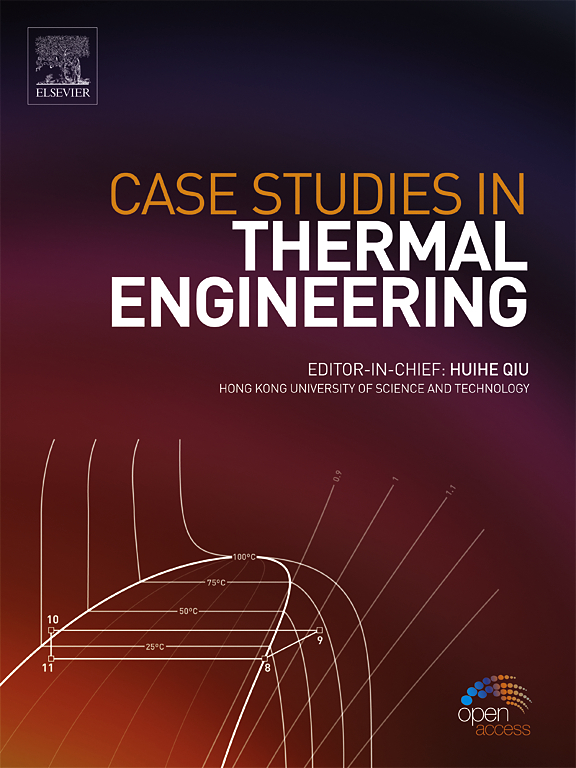Thermal performance and applications of Bauhinia Vahlii fiber-reinforced epoxy composites with porcelain Filler: Development and characterization
IF 6.4
2区 工程技术
Q1 THERMODYNAMICS
引用次数: 0
Abstract
This work presents an alternate material for sustainable building, primarily aimed at tile replacement, through the development of a unique Bauhinia Vahlii fiber (BVF)-reinforced epoxy composite infused with porcelain filler. The formulation with 4 % filler (C4) proved to be the most beneficial, demonstrating enhanced mechanical, thermal, and antibacterial qualities, hence serving as a feasible alternative to traditional tile materials. C4 exhibited remarkable mechanical properties, featuring a tensile strength of 42 MPa, compressive strength of 46 MPa, flexural strength of 43 MPa, and an impact strength of 15.92 kJ/m2, hence providing durability for high-stress applications. The Shore D hardness of 53 further validates its appropriateness for rigorous building settings. Thermal investigation demonstrated C4's capacity to endure high temperatures, exhibiting a heat deflection temperature of 98 °C and a thermal conductivity of 1.52 W/mK, underscoring its enhanced thermal stability and suitability for energy-efficient applications. C4, possessing a minimal water absorption rate of 2.4 %, is suitable for moisture-resistant applications in damp environments within structures. Fatigue tests validated its durability, sustaining a fatigue strength of 70 MPa after 10,000 cycles. C4 had notable antibacterial action, producing a 17 mm inhibition zone against Streptococcus pyogenes, comparable to streptomycin's efficacy. Biofilm studies shown significant bacterial suppression, rendering it extremely appropriate for sanitary environments such as kitchens and toilets. The hydrophobic characteristics of C4, evidenced by a contact angle of 89.80°, augment its resistance to moisture and contaminants, so bolstering its viability as a sustainable and high-performance alternative to traditional tiles in contemporary construction.
陶瓷填料紫荆纤维增强环氧复合材料的热性能与应用:开发与表征
这项工作提出了一种可持续建筑的替代材料,主要是为了替代瓷砖,通过开发一种独特的紫荆花纤维(BVF)增强环氧复合材料注入陶瓷填料。含有4%填料(C4)的配方被证明是最有益的,表现出增强的机械,热和抗菌性能,因此可以作为传统瓷砖材料的可行替代品。C4具有优异的力学性能,抗拉强度为42 MPa,抗压强度为46 MPa,抗折强度为43 MPa,冲击强度为15.92 kJ/m2,因此在高应力应用中具有耐久性。肖尔D硬度为53,进一步验证了它在严格的建筑环境中的适用性。热研究表明,C4具有耐高温的能力,表现出98°C的热偏转温度和1.52 W/mK的导热系数,强调了其增强的热稳定性和节能应用的适用性。C4具有2.4%的最小吸水率,适用于结构内潮湿环境中的防潮应用。疲劳测试验证了其耐久性,在10,000次循环后保持70 MPa的疲劳强度。C4具有明显的抑菌作用,对化脓性链球菌产生17 mm的抑菌带,抑菌效果与链霉素相当。生物膜研究表明,细菌抑制作用显著,使其非常适用于卫生环境,如厨房和厕所。C4的疏水特性,通过89.80°的接触角证明,增强了它对湿气和污染物的抵抗力,因此增强了它作为当代建筑中传统瓷砖的可持续和高性能替代品的可行性。
本文章由计算机程序翻译,如有差异,请以英文原文为准。
求助全文
约1分钟内获得全文
求助全文
来源期刊

Case Studies in Thermal Engineering
Chemical Engineering-Fluid Flow and Transfer Processes
CiteScore
8.60
自引率
11.80%
发文量
812
审稿时长
76 days
期刊介绍:
Case Studies in Thermal Engineering provides a forum for the rapid publication of short, structured Case Studies in Thermal Engineering and related Short Communications. It provides an essential compendium of case studies for researchers and practitioners in the field of thermal engineering and others who are interested in aspects of thermal engineering cases that could affect other engineering processes. The journal not only publishes new and novel case studies, but also provides a forum for the publication of high quality descriptions of classic thermal engineering problems. The scope of the journal includes case studies of thermal engineering problems in components, devices and systems using existing experimental and numerical techniques in the areas of mechanical, aerospace, chemical, medical, thermal management for electronics, heat exchangers, regeneration, solar thermal energy, thermal storage, building energy conservation, and power generation. Case studies of thermal problems in other areas will also be considered.
 求助内容:
求助内容: 应助结果提醒方式:
应助结果提醒方式:


